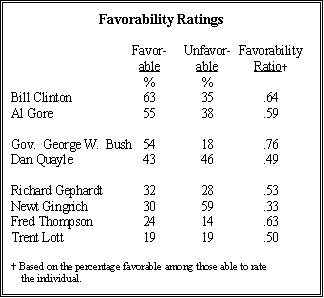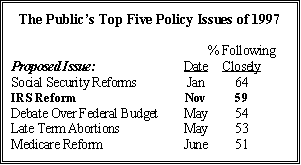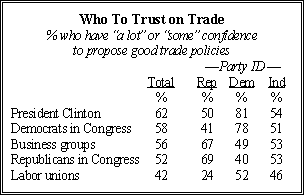Clinton and Congressional Ratings Unchanged
President Clinton’s approval ratings remain high and Americans credit Congress for its accomplishments this year, despite the failure of campaign finance and “fast track” trade legislation in the weeks leading up to the congressional adjournment. Nearly one in four Americans say this Congress has accomplished more than other recent Congresses, while only 12% say it accomplished less.
Clinton continues to enjoy high job approval (58% to 31%), while the public remains divided over Republican leaders in Congress (41% to 43%). These ratings, as Congress adjourned for the year, are essentially the same as in August following enactment of the balanced budget package.
Congress wins more praise for its policy achievements than for the campaign finance and other investigations that dominated much of this year’s agenda. Balanced-budget legislation, tax reforms and welfare reform top Americans’ list of the most important congressional accomplishments. The balanced budget and tax reform package resonates especially with Republicans, who list these accomplishments substantially more often than Democrats (20% vs 5%).
Serious Wrongdoing, Too Partisan
With congressional hearings on improper campaign contributions continuing to draw only modest interest, the public seems to view the investigations with a mix of cynicism and frustration. Nearly two-thirds of those who did not follow the investigations “very closely” say the hearings are “just partisan politics” (62%) and think that “politicians always find ways to stretch the campaign finance rules” (61%). But while many may view the hearings as politics as usual and a plurality (40%) believes that Congress is paying too much attention to the controversy, only 28% say there was “no serious wrongdoing.”

More broadly, the high marks for Clinton and the general satisfaction with Congress reflect a sense that the country is making progress on a wide range of problem areas. Nearly half of Americans (48%) say the nation is making progress on AIDS, for example, almost twice as many as felt that way in April 1995. Similarly, 32% say the country is making progress on the federal budget deficit, up nearly 10% points from a year ago.
Men and women differ substantially on the amount of progress made in these areas. The number of men who say the country is making progress on the budget deficit is 15% points higher than a year ago, compared with a mere 4% point increase among women. In contrast, the number of women who think the country is making progress on AIDS is 27% points higher than in 1995, compared with an 18% point increase among men.
Americans believe the nation is moving forward in other areas as well, including crime, welfare and the availability of good paying jobs. Indeed, in none of the 14 problem areas included in the Pew survey was there a significant increase in the percentage of people saying the country is “losing ground.”
Looking To 2000, Gender Gap Looms Large
Heading into the first open presidential race in over a decade, Americans are evenly divided in their party preferences: 36% say they are more likely to vote for a Democrat for president and 34% for a Republican. This is roughly the same distribution as in August 1986, the mid-point of Reagan’s second term. But fully 80% of those who voted for former Sen. Bob Dole in 1996 say they will vote for a Republican again in 2000, while just 60% of Clinton voters say they will vote for a Democrat in the next presidential election.
Party preferences continue to reflect a substantial gender gap in American politics, with women favoring a Democrat over a Republican by a 42% to 28% margin and men favoring a Republican, 39% to 30%.

While the campaign finance scandal initially took a toll on Al Gore, the vice president’s favorability rating is now 55%, similar to his rating over the summer. Gore remains among the highest-rated of several possible candidates in the next presidential election, though Texas Governor George W. Bush gets a similar rating, 54%. Bush’s favorability among Republicans who were able to rate him (93%) is well above either Gore’s (80%) or House Minority Leader Richard Gephardt’s (58%) among the Democrats who could rate their party leaders. Meanwhile, former Vice President Dan Quayle continues to get mixed ratings from the public (43% favorable, 46% unfavorable), but higher ratings among Republicans who can rate him (68% to 32%).
All Eyes On Iraq
Several major news stories broke in the last month, capturing above-average levels of attention. The escalating tensions in Iraq, where the United States was blocked from international weapons inspection teams, topped the list of most closely followed news stories. Three in four Americans followed the Iraq situation closely, with 44% following “very closely.” The story ranks second only to the death of Princess Diana for major news this year.

Congressional proposals to reform the I.R.S. also drew widespread attention. With one in four Americans following the story “very closely,” it ranked among the top domestic policy stories of the year. The I.R.S. story was followed “very closely” by as many Democrats (28%) as Republicans (24%).
Dramatic news from Wall Street and a Massachusetts courtroom also drew relatively large audiences. Nearly two-thirds of Americans (61%) followed the recent ups and downs in the stock market (with 25% following “very closely”). A similar number followed the trial of Louise Woodward, the British au pair accused of murdering an 8-month old child (65%, with 29% following “very closely”). Few Americans — just 4%, or 11% of those who regularly go on-line — logged onto their computers to get news about the case.

Among these top stories, women paid closer attention to the au pair trial (34% following “very closely,” compared to 23% of men), while men paid more attention to news about Iraq (51%, compared to 37% of women) and the stock market (33%, compared to 18% among women).
With the exception of the proposed I.R.S. reforms, other political news drew smaller audiences. Congressional hearings on improper campaign contributions continued to raise little interest, with only 16% following “very closely.” Interest in the November elections in Virginia, New Jersey and New York also dropped considerably, down 17% points from similar elections in 1989. Chinese President Jiang Zemin’s visit, the debate over U.S. policy on global warming and news about “fast track” trade legislation also drew little attention.
The Bosnian Commitment?
Most Americans (71%) are aware of the continued presence of U.S. troops in Bosnia, but there is considerable uncertainty about the duration of the American commitment. One third of the public (32%) knows that troops were sent for “a specified time period;” an equal number believe troops were sent to secure peace “no matter how long it takes.”
The public remains divided in their support for the U.S. military presence in Bosnia (50% approve, 42% disapprove), though approval is somewhat higher than in recent surveys.
NAFTA Is Jobs
The public remains divided on the merits of the North American Free Trade Agreement– 47% say the agreement is a good thing from a U.S. point of view, 34% say it is a bad thing. Those who have a positive view of the agreement volunteer a varied list of reasons for their support: 18% say it is a good thing in general; 14% support the concept of trade; and 7% say trade will increase. Opponents, on the other hand, are single-minded in their criticism: Fully 46% volunteer the loss of jobs. Another 10% say companies will leave the country as a result of the agreement. There is also a sense that the agreement is not fair, in that it favors other countries (7%) or does not put America first (7%).

Americans rank the President slightly ahead of congressional leaders on his ability to propose good trade policies. These confidence levels are very similar to ratings on environmental policy. More people trust business on trade policy, however, than have confidence in corporate America with regard to environmental policy (56% vs 43%). The public overall has least faith in labor to propose good trade policies: Even am




